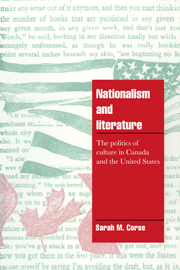Book contents
- Frontmatter
- Contents
- List of tables
- Acknowledgments
- 1 Introduction: cultural fields and literary use
- 2 Nation-building and the historical timing of a national literature in the United States
- 3 Nation-building and the historical timing of a national literature in Canada
- 4 The canonical novels: the politics of cultural nationalism
- 5 The literary prize winners: revision and renewal
- 6 The bestsellers: the economics of publishing and the convergence of popular taste
- 7 Literary meaning and cultural use
- Appendix A The canonical novels
- Appendix B The literary prize winners (1978–1987)
- Appendix C The bestsellers (1978–1987)
- Appendix D Coding sheet
- Appendix E Generic categories
- References
- Index
6 - The bestsellers: the economics of publishing and the convergence of popular taste
Published online by Cambridge University Press: 11 May 2010
- Frontmatter
- Contents
- List of tables
- Acknowledgments
- 1 Introduction: cultural fields and literary use
- 2 Nation-building and the historical timing of a national literature in the United States
- 3 Nation-building and the historical timing of a national literature in Canada
- 4 The canonical novels: the politics of cultural nationalism
- 5 The literary prize winners: revision and renewal
- 6 The bestsellers: the economics of publishing and the convergence of popular taste
- 7 Literary meaning and cultural use
- Appendix A The canonical novels
- Appendix B The literary prize winners (1978–1987)
- Appendix C The bestsellers (1978–1987)
- Appendix D Coding sheet
- Appendix E Generic categories
- References
- Index
Summary
The truth, should you insist, was that the increasing dismissal of his work in the critical press as that of a “popular writer” (which was, as he understood it, one step – a small one – above that of a “hack”) had hurt him quite badly. It didn't jibe with his self-image as a Serious Writer who was only churning out these shitty romances in order to subsidize his (flourish of trumpets, please!) REAL WORK! Had he hated Misery? Had he really? If so, why had it been so easy to slip back into her world? … Perhaps all he had hated was the fact that her face on the dust jackets had overshadowed his in his author photographs, not allowing the critics to see that they were dealing with a young Mailer or Cheever here – that they were dealing with a heavyweight here. As a result, hadn't his “serious fiction” become steadily more self-conscious … Look at me! Look at how good this is! Hey, guys! This stuff has got a sliding perspective! This stuff has got stream-of-consciousness interludes! This is my REAL WORK … Don't you DARE turn away from my REAL WORK!
Paul Sheldon, the writer-protagonist of Stephen King's Misery, reconsidering his own unquestioning acceptance of the highculture/popular-culture hierarchy (1988: 286)In the first five chapters, my attention has been concentrated on the realm of high culture, with a concomitant focus on cross-national differences between American and Canadian literature.
- Type
- Chapter
- Information
- Nationalism and LiteratureThe Politics of Culture in Canada and the United States, pp. 129 - 154Publisher: Cambridge University PressPrint publication year: 1996

